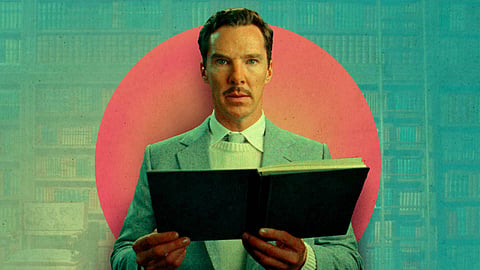
- Reviews
- Power List 2024
- Cannes 2024
- In-Depth Stories
- Web Stories
- News
- FC Lists
- Interviews
- Features
- FC SpecialsFC Specials

Cast: Benedict Cumberbatch, Dev Patel, Richard Ayaode, Ralph Fiennes, Ben Kingsley, Rupert Friend
Duration: 39 minutes
Director: Wes Anderson
Available on: Netflix
Wes Anderson gives artifice a good reputation. By his barefaced, shameless, relentless insistence upon it, until it produces the effect of being stuffed, of having seen too much and with the rattling pace of deadpan dialogues, having heard too much. With his latest short film The Wonderful Story of Henry Sugar, adapted from Roald Dahl’s short story — one of four, including The Swan, The Rat Catcher, and Poison — he pulls this lever of speed, of artifice, so hard, he breaks it.
It begins, not with the story itself, but with Roald Dahl (Ralph Fiennes) taking us through his daily regimen, his space, and then, to his narrating the story of Henry Sugar (Benedict Cumberbatch). This is because, as Anderson notes in interviews, he was in love with the voice of Dahl’s narration, that detached yet notorious dryness, and wanted to somehow lasso that into the film. The narration, which was at first done by Dahl, switches to Sugar, and then, switches again. And again. Till subjectivity, the very question of whose story this is about, sounds silly.
When someone knocks Z.Z. Chatterjee (Dev Patel), head surgeon at the Lords And Ladies Hospital, Calcutta (Cal-Ka-Tah), says, “‘Come in,’ I said”. (Look at the double and single quotes again.) Chatterjee turns to us when he says “I said”, making eye contact, making us aware that this is in fact a performance of something that has been written before, that he is a puppet, not a protagonist. Z.Z. Chatterjee is a character in a story that is being read by Henry Sugar, from a journal he finds in a library. Sugar is a character of Roald Dahl’s imagination, or, perhaps, as is suggested, Dahl’s recreation of a real person. What is subjectivity at this point? When Chatterjee says “I said”, which “I” is this? Anderson’s cinema doesn’t turn subjectivity on its head as much as render the very question of subjectivity redundant.
This further swirls when Z.Z. Chatterjee comes across Imdad Khan, a street performer, who can see without his eyes. Awed by Khan’s performance, Chatterjee asks him to explain this strange power. We descend further (or is it ascend?) into the story, with Imdad’s narration of his life, his journey, his I-ness. And then, slowly the film ascends (or is it descends?) back to Chatterjee, to Sugar, then Dahl. All in the span of a measly 40-minutes.
The film derives its energy entirely from this switcheroo, from this Matryoshka Doll-ing of the narrative, and when it stops, when it all stops, it feels like a centrifugal force has suddenly been stilled. The emotional echo comes from that moment — when you are trying to step out of the film, your ears ringing, your head spinning.
At his best Wes Anderson is capable of elevating artifice and this neat chaos, by both making us feel and making us realise who we are feeling for is a fictional concoction. In Asteroid City (2023), one of the characters of the play is a fresh widower. We don’t see his wife. We don’t see the love they shared, but we do inhabit his grief. It is that intensity of feeling which is missing in The Wonderful Story of Henry Sugar which, instead, is a concentrated, heady pill of Andersonisms, what critic Leo Robson called his “storm in a snowglobe”.
With respect to the film’s relation to the text itself, it is not just about Bombay becoming Calcutta, but also, in the fracas around Roald Dahl’s legacy of offensive prose, Anderson has stepped in as conscience bearer. Z.Z. Chatterjee is entirely Anderson’s creation. It was John Cartwright in the original, who kept referring to Imdad Khan as the “Indian”. In the film, he is always called by his name, insisting on his personhood — Imdad Khan, not just an “Indian”. But, really, in a Wes Anderson universe, does that mean anything? Who is who, anyway?